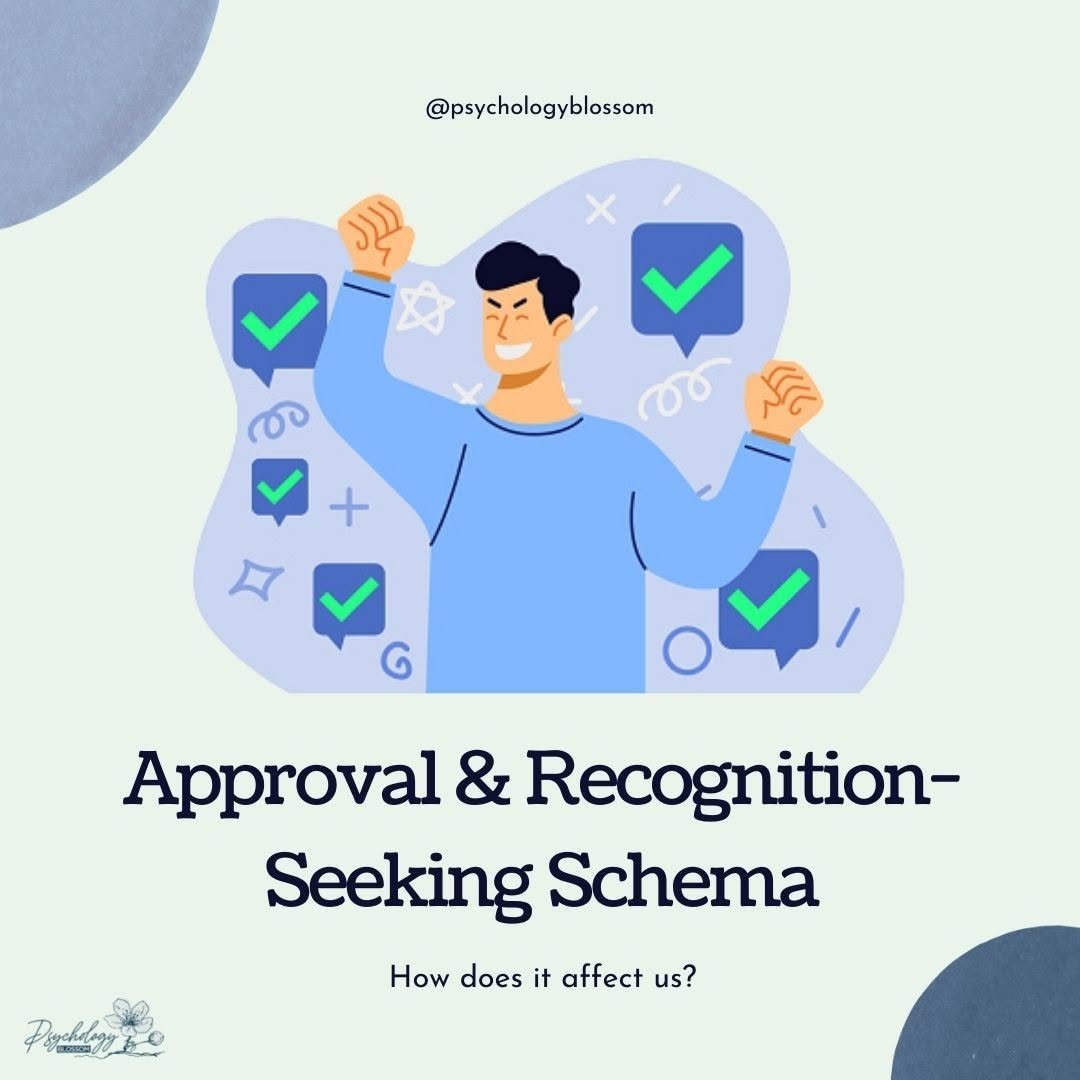Before diving into specific schemas, you might want to read our
introduction to Schema Therapy.
It provides a clear overview of the model and how schemas are understood and worked with in therapy.
Approval Seeking Schema: Understanding the Need for Validation
We all may occasionally enjoy recognition and approval from people around us for the things we do. However, individuals who have developed a Recognition Approval and Seeking Schema may experience an excessive compulsion or need to receive approval from others that can influence their decisions on what they pursue and how they interact with people.
Importantly, when this approval is given, it can make their day feel fantastic, whereas if it is even slightly withdrawn, things can come crashing down emotionally. This leaves one’s self-esteem on wobbly ground, highly dependent on the opinions and agendas of other people.
The true need behind this schema is to feel confident in our core sense of self — to feel worthy and lovable for who we are, independent of external validation.
Reactions from the Approval Seeking Schema
There are three ways in which people often react when this schema is activated.
✽ Surrender
Surrendering, or giving in to the schema, involves constantly hoping and working for others’ approval. Individuals may focus on pleasing, impressing, or adapting to others in order to avoid rejection. Over time, this can be exhausting and lead to feelings of resentment or emptiness.
✽ Avoidance
Avoidance involves steering clear of people in positions of authority or those whose approval feels particularly important. Such individuals may become invisible in workplaces or social circles, avoiding tasks or roles that could put them under scrutiny. This withdrawal prevents growth and keeps them from developing authentic confidence.
✽ Overcompensation
Overcompensation occurs when a person deliberately seeks disapproval, acting defiantly or being purposefully offensive. Ironically, this behaviour is still driven by the desire for recognition, as it provokes attention and reinforces the cycle of dependency on others’ opinions.
Causes of the Recognition and Approval Seeking Schema
As children, approval seekers were often not encouraged to develop their own ideas, preferences, or paths. Instead, they grew up prioritising the opinions of others over their own sense of self.
- Families placed excessive importance on “keeping up appearances” and worrying about what others thought.
- Parents exerted tight control over children’s hobbies, friendships, or educational paths, leaving little room for autonomy.
- Love and attention were conditional, provided only when children “pleased” their parents or met external expectations.
Over time, these experiences created adults who struggle to trust their own instincts, constantly searching for external validation to feel secure.
Effects of the Recognition and Approval Seeking Schema
One of the most significant consequences of this schema is the loss of a stable and authentic sense of self.
People may spend enormous amounts of time trying to anticipate what others want, ignoring their own needs, desires, and values. They become like chameleons, shifting personality and behaviour depending on their environment.
This can be emotionally exhausting, as individuals constantly ruminate over what they said or did, worrying they might have offended someone. Hypersensitivity to rejection means even small disagreements or criticisms can be perceived as abandonment, leading to intense emotional reactions.
Long-term, this schema often results in:
- Superficial relationships based on approval rather than authentic connection
- Unfulfilling careers chosen to impress others instead of aligning with passions
- Low self-esteem tied to popularity, recognition, or external praise
- Chronic anxiety and fear of rejection
Ultimately, individuals may feel unfulfilled because their lives are shaped more by what others expect than by what they genuinely want.
Treatment for the Recognition and Approval Seeking Schema
✽ Schema Therapy
Schema Therapy explores early life experiences that created this deep need for approval. It uses cognitive, behavioural, experiential, and interpersonal techniques to challenge core beliefs and reduce dependency on external validation.
In therapy, clients learn to differentiate between situations where approval seeking is appropriate (e.g., professional feedback) and situations where it is unnecessary. This empowers them to act authentically without constant reassurance.
Therapists also help clients strengthen their sense of self-worth, independent of others’ opinions. Through imagery work, role play, and reparenting techniques, individuals can reframe childhood experiences and learn that their value is not conditional.
As clients progress, they begin to make life choices — careers, relationships, hobbies — based on their own desires and values, leading to greater fulfillment and confidence.
If this schema resonates with you, consider reaching out for a Counselling Session at Psychology Blossom. Professional support can help break the cycle and build a healthier, more resilient sense of self.
We recommend This Video to those who want to learn more about the Approval & Recognition-Seeking Schema.
